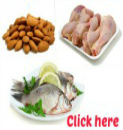Vitamin Deficiency Diseases and their Treatment
Vitamin deficiency diseases occur commonly in association with protein energy malnutrition (PEM). Isolated vitamin deficiencies unassociated with PEM rarely are seen, with the exception of folate (folic acid) deficiency.
Daily intake of some protective foods, such as green leaves, vegetables and fruits, prevents these diseases. So when you eat, put some colour into your daily food.
Vitamin A Deficiency
Lack of vitamin A (carotene and retinol) causes damage mainly to the eyes, but the skin also is affected. The disease is called xerophthalmia, which means ‘dry eye’.
Symptoms of Vitamin A Deficiency
Reversible dryness of the conjunctiva and the cornea, xerophthalmia, in the early stage.
Later, keratomalacia, irreversible damage of the cornea with scarring or rupture of the eyeball, causes blindness.
Bitot’s spots. These are white, “foamy” areas often seen near the lateral part of the white of the eye.
Night blindness may be an early complaint.
Fairly recently it has been realized that lack of vitamin A decreases the resistance of the body to infections, particularly measles and diarrhoea, possibly through its effects on maintaining the health of skin and mucous membranes.
Treatment
Vitamin A 200,000 i.u orally immediately and 200,000 i.u orally the following day, with a third and fourth dose of 200,000 i.u orally 1 to 4 weeks later. In children below 12 months, give half dose.
Vitamin B Deficiency
Vitamin B deficiency, that is, lack of vitamin B1 (thiamine or aneurine) is usually associated with a polished-rice diet and rarely occurs in Africa. The disease is called beriberi, which means ‘weakness’ and refers to the neuropathy seen in adults. In infants, an acute form with congestive cardiac failure can occur.
Vitamin B2 (riboflavine) deficiency causes mucocutaneous lesions – angular stomatitis, sore cracked lips, glossitis.
Nicotinic acid deficiency causes pellagra. It occurs mainly in adults. Hyperpigmented lesions on the parts of the body exposed to light are characteristic.
Folate (folic acid) or, rarely in children, vitamin B12 deficiency may be a contribution factor to anaemia. It is quite common in pregnancy and in conditions such as recurrent haemolytic anaemias and malaria where the demand to make red blood cells is great. It also contributes as a growth factor in achieving full rehabilitation in protein energy malnutrition.
Treatment
Vitamin B-comples preparations or multivitamins orally.
Vitamin C Deficiency
Lack of vitamin C (ascorbic acid) causes scarvy. It can occur in children, especially refugees, mainly from 6 to 16 months, when no vegetables or fruits are given. Bleeding of the gums and very painful swelling of the long bones occurs due to subperiosteal haemorrhages.
Treatment
Ascorbic acid 1 gram, or fruit juices will cure the disease. Vitamin C recently has been found to increase iron absorption.
Vitamin D Deficiency
Lack of vitamin D causes rickets, especially in children who are seldom exposed to sunlight. Traditional practices of protecting newborns from the sun up to 3 months of age, and prematurity, may be associated with early rickets.
Patients may experience frequent respiratory infections. Their calcification of bones is impaired as well. Vitamin D deficiency can be prevented easily by 10 minutes exposure to the sun each day.
The above vitamin deficiency diseases can all be prevented by eating a health balanced diet. Ensure that foods from all the food groups are included in your daily diets.
Return from vitamin deficiency diseases to vitamin supplements








New! Comments
Have your say about what you just read! Leave me a comment in the box below.